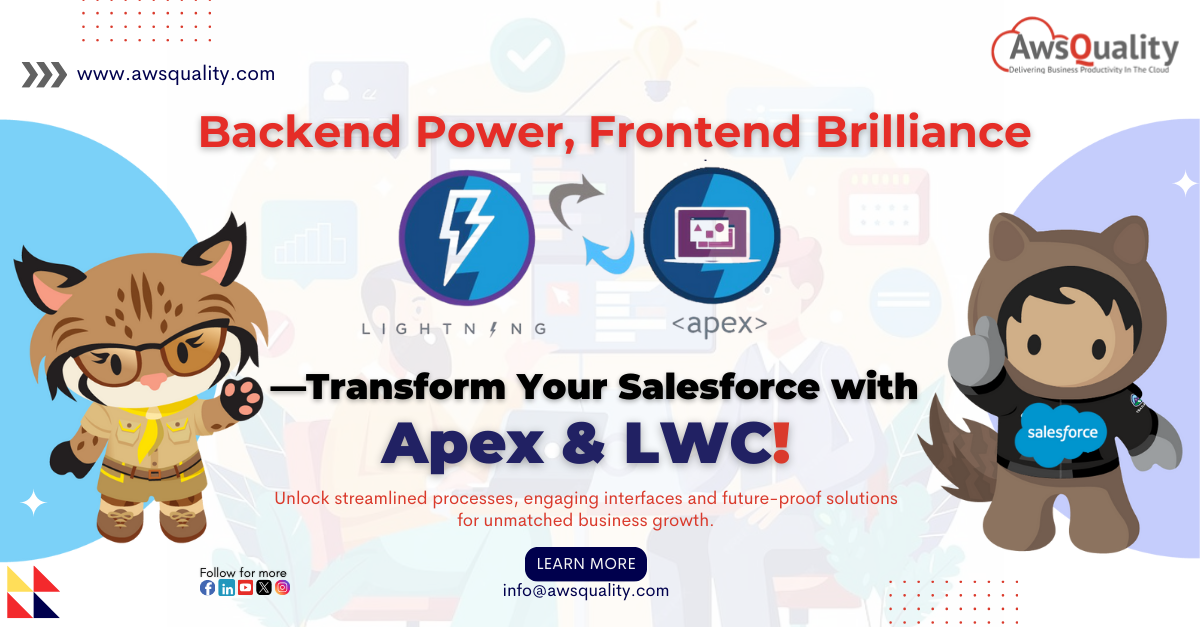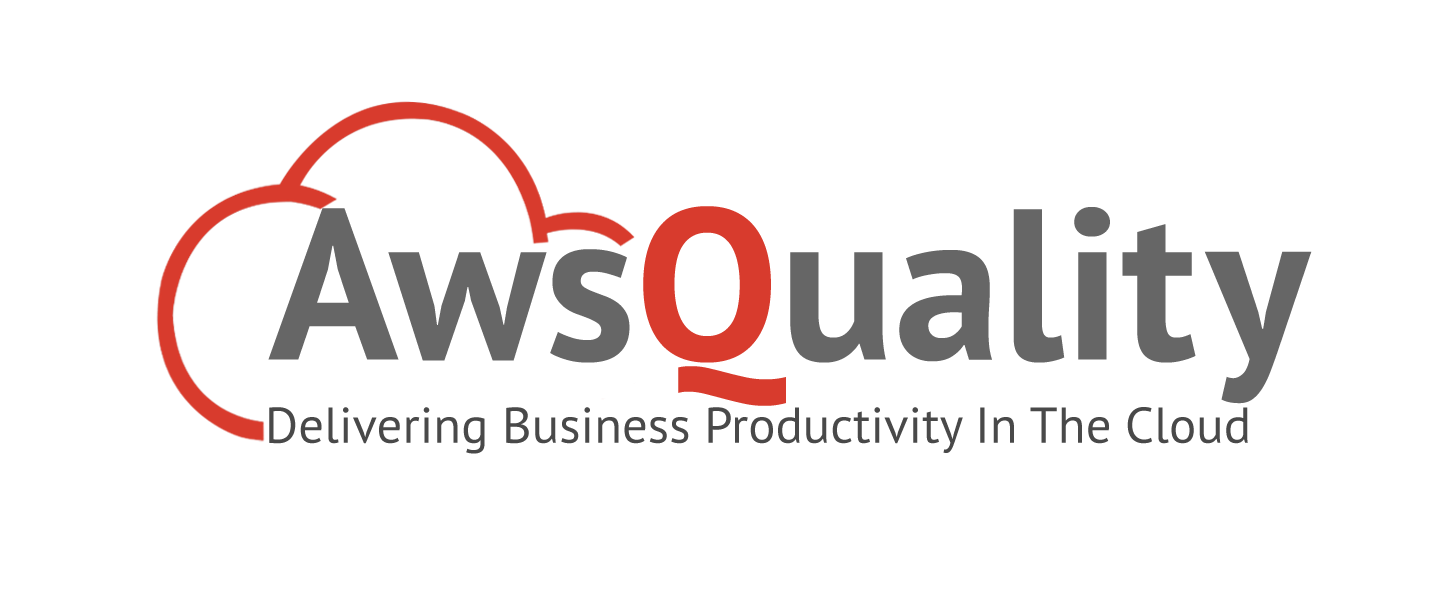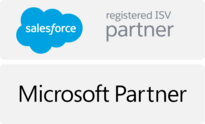
Introduction- Salesforce development provides a variety of tools and frameworks to build powerful and customised CRM solutions. Two of the most prominent technologies in Salesforce development are Salesforce Apex and Lightning Web Components (LWC). While Apex is a backend programming language for business logic and database operations, LWC is a modern UI framework designed for building dynamic and responsive user interfaces. In this article, we will explore the differences between Salesforce Apex vs. LWC, discuss Salesforce coding languages, analyse Apex triggers v/s. Lightning Web Components and examine how custom Salesforce development can benefit businesses. If you are looking for the best Salesforce consulting partner or services, AwsQuality can help you implement the right strategy for your business needs.
Understanding Salesforce Apex
Salesforce Apex is a strongly typed, object-oriented programming language similar to Java, designed for server-side logic execution in Salesforce. It is used for executing backend processes such as:
- Database Manipulation: CRUD (Create, Read, Update, Delete) operations on Salesforce objects.
- Custom Business Logic: Automating processes using triggers, batch jobs and scheduled jobs.
- Integration with External Systems: Connecting Salesforce with external APIs and third-party services.
- Workflow Automation: Implementing logic beyond standard Salesforce automation tools like Workflow Rules and Process Builder.
Key Features of Apex:
- Event-driven Execution: Apex triggers allow developers to execute code before or after database operations.
- Scalability: Apex batch processing helps handle large data sets efficiently.
- Security and Data Integrity: Apex runs in a multi-tenant environment with built-in governor limits to prevent overuse of shared resources.
Understanding Lightning Web Components (LWC)
Lightning Web Components (LWC) is a modern UI framework that allows developers to create dynamic and interactive front-end components in Salesforce. It is built on web standards such as JavaScript, HTML and CSS, making it more efficient and reusable than its predecessor, Aura Components.
Key Features of LWC:
- Component-Based Architecture: Reusable UI elements enhance development efficiency.
- Lightning Fast Performance: Optimised for Salesforce’s Lightning Experience.
- Native Browser Support: Leverages standard JavaScript functionality for better performance.
- Seamless Integration with Apex: Fetches and processes data from Apex controllers for real-time updates.
Salesforce Coding Languages
Salesforce development requires proficiency in multiple coding languages depending on the application’s needs:
1. Apex:
- Server-side programming language.
- Used for backend logic and database interactions.
- Similar syntax to Java.
2. Lightning Web Components (LWC):
- Uses JavaScript, HTML and CSS.
- Focuses on front-end development.
- Provides a modern and efficient UI experience.
3. Visualforce (Older Technology):
- Based on XML-like markup language.
- Still used for legacy applications and PDF generation.
4. SOQL (Salesforce Object Query Language):
- A query language used to retrieve data from Salesforce databases. Understanding these languages allows developers to build comprehensive custom Salesforce development solutions.
Custom Salesforce Development
Businesses often require custom solutions to extend Salesforce’s native capabilities. Custom development allows organizations to tailor the platform to their unique needs using Apex and LWC.
Benefits of Custom Salesforce Development:
- Enhanced Business Processes: Automate workflows that standard Salesforce features cannot handle.
- Personalised User Experience: Design intuitive and efficient user interfaces using LWC.
- Seamless Integrations: Connect Salesforce with external applications and services using Apex APIs.
- Scalability: Develop solutions that grow with the business.
Apex Triggers vs. Lightning Web Components
Apex Triggers and LWC serve different purposes but are often used together to achieve comprehensive Salesforce solutions.
| Feature | Apex Triggers | Lightning Web Components (LWC) |
| Purpose | Backend automation and data processing | Frontend UI development and interactivity |
| Execution | Executes on data changes (Insert, Update, Delete) | Runs on the client-side, enhancing user experience |
| Use Cases | Workflows, validations, automated tasks | Custom UI, dashboards, real-time data visualisation |
| Performance | Optimised for backend operations | Optimised for frontend rendering and user interactions |
Choosing the Right Technology for Your Project
The choice between Apex and LWC depends on your specific business requirements. If your project involves heavy data processing, complex automation, or system integrations, Apex is the right choice. On the other hand, if you need a sleek, interactive and fast-performing UI, LWC is the best option.
For businesses looking to implement a Salesforce Consulting Partner strategy in regions like the UAE, Middle East and UK, selecting the right mix of Apex and LWC is crucial for optimising their Salesforce CRM. With AwsQuality, you get expert guidance on Salesforce consulting services tailored to your unique business needs.
Conclusion,
Salesforce Apex and Lightning Web Components (LWC) are integral to custom Salesforce development, each playing a crucial role in optimizing business applications. Apex, a powerful backend coding language, enables the creation of complex business logic, including Apex Triggers and controllers, ensuring data integrity and automation within Salesforce CRM. On the other hand, LWC enhances user experience with dynamic, high-performance front-end components, improving usability and engagement.
For businesses aiming to scale efficiently, leveraging both Apex and LWC in their Salesforce consulting partner strategy is essential. Companies operating in the UK, UAE or the broader Middle East can benefit significantly by collaborating with experienced Salesforce consulting partners who understand the different Salesforce consulting partner levels and how to maximise their impact.
Choosing the right Salesforce consulting services helps organisations unlock the full potential of Salesforce CRM, ensuring seamless integration, improved workflows and greater ROI. If you’re looking for expert guidance, AwsQuality provides industry-leading solutions tailored to your business needs. Contact us today via email at info@awsquality.com or sales@awsquality.com to explore how Apex and LWC can transform your Salesforce environment!
FAQs: Apex vs. LWC
1. Which is better for my project: Apex or LWC?
- Use Apex for backend processes, business logic and database management.
- Use LWC for creating dynamic and responsive front-end interfaces.
- Most projects require a combination of both.
2. Can Apex and LWC work together?
- Yes! LWC interacts with Apex to fetch and process data, ensuring smooth communication between the UI and backend.
3. How do I handle errors between Apex and LWC?
- Apex: Use try-catch blocks to catch and return error messages.
- LWC: Handle errors gracefully and display meaningful messages to users.
4. What are the advantages of using LWC over Visualforce?
- LWC offers faster performance, better user experience and modern web standards, making it superior to Visualforce for new projects.




